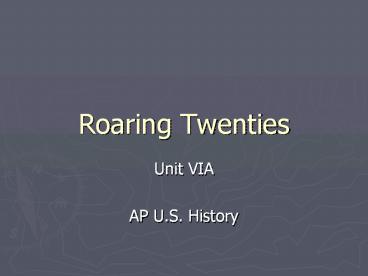Roaring Twenties - PowerPoint PPT Presentation
1 / 22
Title: Roaring Twenties
1
Roaring Twenties
- Unit VIA
- AP U.S. History
2
Fundamental Question
- Did the Roaring Twenties continue the Progressive
Era reforms and did it reflect its description as
roaring?
3
Election of 1920
- Democrats
- James M. Cox
- Republicans
- Warren G. Harding
- A Return to Normalcy
- Socialist Party
- Eugene V. Debs
- Received 913,664 votes despite incarceration
4
Warren G. Harding (R) (1921-1923)
- A Return to Normalcy.
- Budget and Accounting Act (1921)
- President required to submit annual budget to
Congress - Bureau of the Budget
- Emergency Quota Act (1921)
- Fordney-McCumber Tariff (1922)
- Increase tariff rates, especially on industrial
goods - Washington Naval Conference (1922-1923)
- Scandalous
- Teapot Dome Scandal
- Bribes for oil fields
- Veterans Bureau fraud and bribery
- Attorney General bribed by almost everyone
- Harding died in office
- Calvin Coolidge assumed presidency
5
Election of 1924
- Democrats
- John W. Davis
- Split primarily over KKK support
- Republicans
- Calvin Coolidge
- Booming economy and conservatism
- Progressive Party
- Robert La Follette
- Liberal alternative to both parties
6
Calvin Coolidge (R)(1923-1928)
- The business of the American people is
business. - Revenue Acts of 1924, 1926, 1928
- National Origins Act (1924)
- Kellogg-Briand Pact (1928)
7
Election of 1928
- Democrats
- Al Smith
- First Catholic major party candidate
- Split the party
- Supported for Catholics
- Supported for anti-Prohibitionist
- Tammany Hall association
- Republicans
- Herbert Hoover
- Ran on continuing economic prosperity and
conservative policies
8
Herbert Hoover (R)(1929-1933)
- Given the chance to go forward with the policies
of the last eight years, we shall soon be in
sight of the day when poverty will be banished
from this nation. - Great Depression Begins
- Volunteerism
- Stock Market Crash of 1929
- Smoot-Hawley Tariff Act (1930)
- Reconstruction Finance Corporation (1932)
- Bonus Army (1932)
9
A Return to NormalcyThe Business of America
is Business
- A Return to Normalcy
- Dedication and inspiration for Progressive reform
waned - World War I reestablished a conservative and
isolationist society - The Business of America is Business
- A reinvigoration of American business prosperity
and consumerism - Social and Cultural Impact
- Urban and Rural divisiveness
- Reactions to Conservatism
10
American Consumer Society
- American economy increasingly competitive
- Welfare Capitalism
- Real income increased for most workers
- Insurance, proft-sharing, worker safety
- Decreased influence of unions
- Mass Production
- Wide variety and availability of consumer
products at affordable prices - Model T
- Domestic appliances
- Installment Plans
- Credit systems to easily acquire products
- National Advertising
- A perception of needing the latest product as
proof of productive and successful life - Automobiles
- Inspired development of highway system and
transportation infrastructure - Invigorated other industries
11
Consumer Ads
12
1920s SocietyBlacks
- White Resentment
- Lynchings increased especially in the South
- Universal Negro Improvement Association
- Marcus Garvey
- Economic solidarity and advancement for blacks
- Failed attempt of mass migration to Africa
- Inspired black pride and nationalism
13
1920s SocietyImmigrants
- First Red Scare and Nativism
- Quota Laws
- Emergency Quota Act (1921)
- 3 of 1910 Census
- National Origins Act (1924)
- 2 of 1890 Census
- Sacco and Vanzetti Trial (1920-1927)
- Two Italian immigrants executed for murder
despite little evidence
14
1920s SocietyWomen
- Voting
- Usually voted as husbands
- Employment
- Clerical, teachers, nurses, domestic servants
- Lower wages and no managerial positions
- Divorces
- Flapper Girl
- Young women of the Jazz Age
- Short hair, short hemline, cosmetics, cigarette
15
1920s Culture WarsProhibition
- Nineteenth Amendment and Volsteadt Act
- Supported by middle-class progressives and rural
Protestants especially in South and West - Generally ignored in urban centers
- Bootleggers/Rumrunners
- Smuggling of alcohol
- Rise of organized crime
- Al Capone
- Speakeasies
- Underground saloons
16
1920s Culture WarsKu Klux Klan
17
1920s Culture WarsReligion
- Fundamentalism
- Literal view of Bible Creationism
- Attacked urban lifestyle and culture
- Revivalists
- Billy Sunday
- Aimee Semple McPherson
- Modernism
- Liberal view of religion
- Acceptance and coordination of science and
context with faith - Scopes Monkey Trial (1925)
- Law against teaching of evolution in Tennessee
public school - Creationism
- William Jennings Bryan
- Evolution
- Clarence Darrow
18
1920s Culture WarsHero Worship
- Athletes, celebrities, innovators famed for
individual accomplishment - A personification of American individualism
- Babe Ruth
- Charles Lindbergh
- Fueled tabloid and gossip columns in newspapers
and magazines
19
1920s Culture WarsEntertainment
- Jazz Age
- Inspiration of rebellious youth and liberal
reaction to conservatism and fundamentalism - Jazz
- Louis Armstrong
- George Gershwin
- Speakeasies
- Dance Clubs
- Waltz to Foxtrot
- Charleston
- Flappers
- Radio
- Mainstream medium (NBC, CBS)
- Cinema
- Talkies
- The Jazz Singer
- Nickelodeons
- Charlie Chaplin
20
1920s Culture WarsLiterature
- The Lost Generation
- Disillusioned by World War I, consumerism, and
modernism - Ernest Hemingway
- The Sun Also Rises
- A Farewell to Arms
- F. Scott Fitzgerald
- The Great Gatsby
21
1920s Culture WarsHarlem Renaissance
- Fueled by the Great Migration and inspired by
black pride - Themes challenged racist stereotypes
- Black is beautiful
- Langston Hughes
22
1920s Culture WarsArt and Architecture
- Art Deco
- Rich colors, geometric shapes, ornamentation
- Modernism
- Expressionism
- Evoke emotional response through distortion
- Precisionism
- Inspired by industrialism and modernization
evoked through geometric shapes
Chrysler Building
Aucassin Charles Demuth, 1921































